Читать книгу Professional Practice for Interior Designers - Christine M. Piotrowski - Страница 167
Commissions and Kickbacks
ОглавлениеIt is not uncommon for interior designers to receive a commission from some vendors when the client purchases products directly from the vendor. These commissions constitute additional revenue to the interior designer. It is not usually very large and is paid to the designer only if the client actually orders from the vendor.
These commissions raise ethical debates and ethical problems. Is the interior designer required to tell the client about these commissions? According to the code of ethics from professional associations, it is necessary to disclose all forms of compensation to the client. Some interior designers debate whether their colleagues should accept these commissions at all.
A clear conflict of interest and unethical situation occurs when a designer receives a kickback. According to the Cornell Law School Web site, kickbacks “entail the return of a certain amount of money from seller to buyer as a result of a collusive agreement.”* Kickbacks are clearly improper and are not the same as the commissions described in the previous paragraph. An example of a kickback is when a vendor gives a special discount to one designer for specifying or bidding on a project but not to other designers who are also bidding on the job. Another example of a kickback is when someone gives a payment of some kind as a very special inducement to favor the specification of one product over another. It is important to note that the discounts or commissions that vendors regularly give to interior designers are not illegal or unethical. It becomes unethical only when the special price is given for special treatment, such as in the preceding examples.
In commercial interior design, a practice that might be considered unethical, but can also be an appropriate business practice, is buying a job. Some firms lower their price drastically on services or bids on goods in order to be awarded a project. Buying a job refers to the practice of pricing the goods or fees at an unusually low level in order to make the sale. Some feel it is unethical because it sets a price with which other firms cannot compete. Others argue that setting a very low price is merely a marketing and business tool to enter a market, to obtain a specific type of work, or for other reasons that are legal and essentially ethical. However, how would you feel if you owned a firm and discovered that you had lost three recent projects to a firm that did not charge a design fee and offered to sell the merchandise to the client at a very substantial discount?
*Cornell Law School, www.law.cornell.edu/wex/kickbacks
